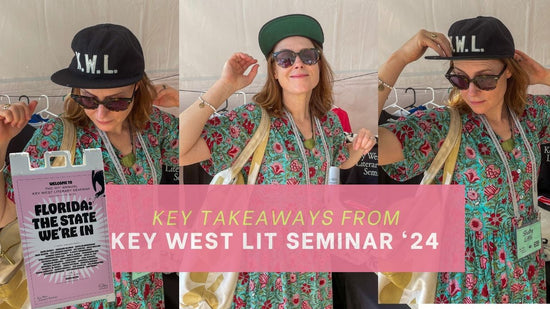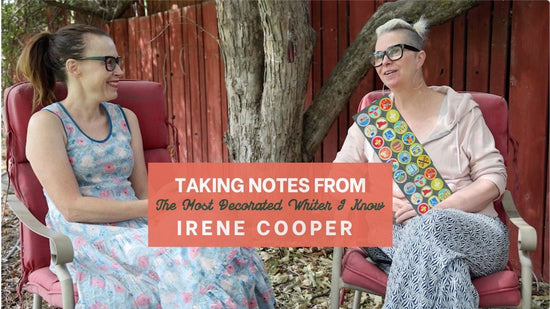I’m gonna lower the jazz hands and stop tap-dancing long enough to share that I am trying to get my personal essays published in traditional, literary magazines. And I'm also gonna share that the odds of my essays getting published are about the same as my odds of running into Mr. Entertaining-Narrative-Nonfiction himself, David Sedaris, in Paris. I have yet to visit Paris.
What is traditional publishing?
For shorter works, I'd say getting published traditionally means having a high-caliber editor accept your work into an esteemed publication—a lit mag, culture magazine, or an academic journal. I'm told if a handful of your shorter pieces get accepted to a traditional publication, your odds of getting a full length book published goes up. And that is what I want, to get a book published. Also, I want to finish writing a book. Either of the books I've started.
I tell you this because I want to express that I am trying to do a hard thing—and there is no certainty that anything positive will come of it—and that is terrifying—but I’m learning to be OK with that. Or rather, I’m coming to peace with that idea, the idea that you can actively push and strive towards a potentially unreachable goal and the effort itself may be fulfilling, or more fulfilling that reaching the goal. Motivational posters cnonvey this well and I quote, The Journey is The Reward.
The writer’s ego is a rabid dog
Certainly the writer’s ego doesn’t like the idea of The Journey is the Reward but let’s face it, the ego is a rabid dog, always trying to tear you apart. It’s something I've noticed in recent years––how my own ego can charge the lawn and ruin a perfectly good afternoon.
I’ve become more selective about when, where and with whom I share my writing because when I am less intentional that ole rascal, the ego, comes sniffing for blood. Said more plainly, when I share a piece of writing with the intention of getting praise back, it is the ego at play, and not the writer. And to remove some pretense from this paragraph, I'll add that I am still guilty of this behavior. Sometimes I'm in a slump and getting a hit of serotonin from positive feedback is just the fix to lift my spirits and propel me forward.
I just don’t want external validation to be my energy source, that’s all.
I’m weening.

What motivates me to write?
I am pursuing writing because it makes me feel good and when I don’t write I am a menace to society—an understanding I could not articulate until I read “Where’d You Go Bernadette” by Maria Semple and a few chapters of my husband’s numerology book.
So why do I want to get published if I don't want to care what others think of my writing?
My 3 reasons for submitting to traditional literary publications:
A deep need to be loved: To come clean with myself and you, I suppose there is a part of me that desperately wants others to like what I write and that feels sad, pathetic, and scary.
I think I can help: But another (hopefully more earnest) motivation is that I believe in the stories I write and the messages in them. What I’m sending out to the literary publications for consideration is a collection of personal essays about the transition to motherhood. I didn’t have any reading material like it, before or after becoming a mother and I wish I had. I wish I’d been exposed to more voices about motherhood, not just medical advice or naptime routines (though more of those would be helpful too), but first-person stories of dynamic women on their journey through life.
A sense of purpose: I honestly just feel called to write and to be a published writer. It’s like a compulsion but one that mostly keeps me out of trouble and brings more levity and joy to my life.

My stats on getting traditionally published
I’m going to get specific about the data of trying to get traditionally published in a literary magazine. I’ll keep it high level so y’all don’t fall asleep.
The first essay I am trying earnest to get published is entitled, “I Called a Dog Psychic.” I submitted it just before the new year to 23 top publications (thanks for babysitting, dad). I also submitted it to a couple pubs that popped up in the spring, so let’s just say I submitted it to 25 far-fetched institutions and magazines. I have heard back from 20 of them and the other 5 are still considering it (or out to lunch for 8+ months). Of those 20 who responded, 17 rejected in an automated manner, but 3 sent me non-standard rejections and that felt very encouraging. One even gave me detailed feedback and prompted me to answer questions within the piece and invited me to submit it again via a special link. And yes, I now live for non-standard rejections.
I have two more essays out for consideration on Submittable, but I did not spread them as far and wide as “I Called a Dog Psychic.” I think I'll gauge the first few responses on these next essays and then decide if they need to be reworked. I can only take so many rejections at one time, unless they are non-standard rejections, which fill my heart with birdsong.
What is a non-standard rejection from a literary magazine?
Sometimes it can be subtle, the response to your rejection just smells human. It feels like an editor added a little flourish at the end of the rejection, inviting you to submit again. But it’s often an ambiguous human touch and leaves you wondering if the flourish was automated too.
Less grey, and truly a win in my books, is an actual custom message an editor writes to you referencing your piece. This is the Holy Grail: you have made contact with the other side. I like to think that the three generous women who personally wrote me a message (yes, while rejecting the piece) are available to be my pen pals, come to the party in my backyard, or available to walk the block with me, but I’m not going to press my luck. It’s just a little indulgence that makes me feel better when another standard rejection comes in.
How to get published as a writer?
Before this year, my previous attempt to get published was in college in the early aughts. I dropped a few printed copies of my poetry into a wooden submission box in Tucker Hall, the English department building at William and Mary, and eventually I got an email that said one poem, “Sliding Friction,” had been accepted. These days, with platforms like Submittable and Duotrope, I'm still searching for that magic submission box.
I am encouraged by what Tom Perrotta said at the Aspen Words Takeaway panel about developing resilience for the submission process:
We need to think about what rejections look like. One day I got one and it said, 'You weren’t selected but you were a finalist for the issue.' Because that, for me, wasn’t a rejection. We need to rethink things to celebrate. And also cultivate irrational self esteem. I remember long before I did everything good, I was certain I was good, because it gets you through some rough times.
How to get traditionally published in a hailstorm of rejections?
For the comments section below:
What are some ways you cope with rejection from literary magazines? Actually, any kind of rejection coping skills you share would be helpful. And how, as an artists, do you cultivate irrational self-esteem about your work?





